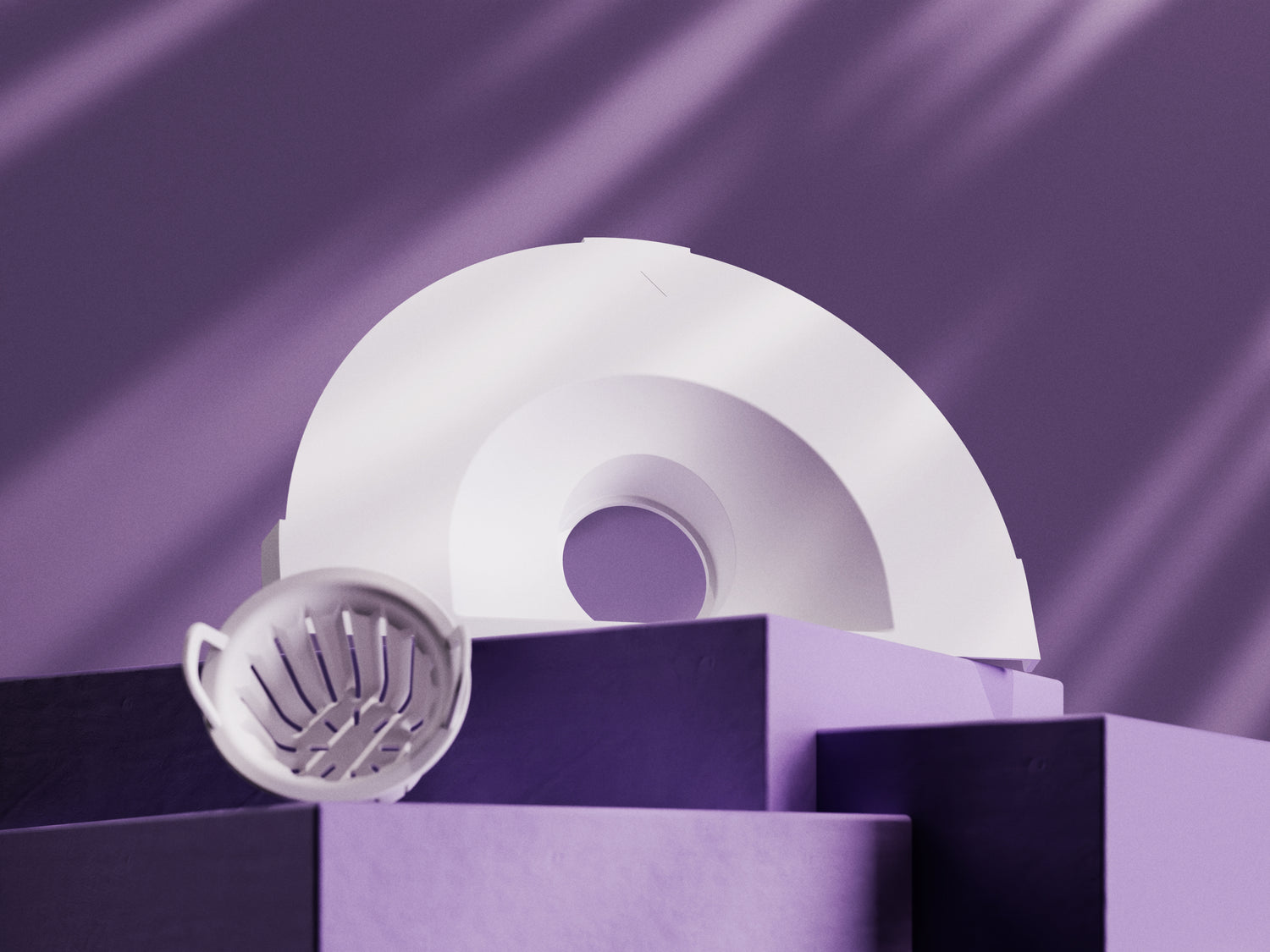The Collection Cradle
The Patented Collection Cradle: Provides a respectful and dignified way to collect pregnancy tissue during a miscarriage. Created with sensitive details in mind, the Collection Cradle allows you to manage this experience at home with care and ease.
The Collection Cradle includes a Seat, Sieve and Storage Container:

Seat
The Seat fits securely on the toilet bowl, just beneath the toilet seat, ensuring stable collection. The seat is designed with a gap at the back to prevent contamination from faecal matter, making it safe and hygienic.

Sieve
The Sieve fits neatly into the toilet insert and features elongated holes, specifically designed to filter viscous liquids while gently retaining any solid tissue.

Storage Container
An opaque, watertight Storage Container designed for secure storage. The Sieve insert fits directly inside, allowing you to place everything into the container without needing to transfer contents separately if preferred. Alternatively, you can empty the contents into the container and continue using the sieve insert as needed.
This Patented Collection Cradle empowers you to manage your experience with flexibility, dignity, and control. Whether you wish to handle the tissue directly, bring it to a healthcare provider, or keep it temporarily, this device supports your needs, making a difficult process as respectful and manageable as possible.
Using the Collection Cradle
If you wish to collect any tissue passed, the opaque, watertight Storage Container and Sieve insert are designed to make this process easier and less distressing. Here’s how to use it:
Step 1
Insert the Sieve into the Seat
Step 2
Lift up toilet seat.
Step 3
Place the device in the toilet bowl at the front.
Step 4
Lower the toilet seat so that it rests securely on top of the device.
Step 5
Use the toilet as usual. The device will collect products of conception, urine, and blood. Faeces will pass directly into the toilet bowl through the gap between the device and the toilet bowl.
Step 6
You have two options for transferring the contents:
6.1. Place the entire Sieve directly into the Storage Container.
6.2 Alternatively, carefully empty the contents from the sieve into the Storage Container provided.

Using the Kit for Cytogenetic Testing
Some may want to understand more about why the pregnancy was not viable. Cytogenetic testing, often offered by healthcare providers, can examine the tissue for genetic information that may provide insight into potential causes.
Preparing for Testing
After using the Sieve and Storage Container, simply bring the sealed container to your healthcare provider if you’re interested in testing. They can guide you through the process and explain any potential findings.
Discussing Your Options
Cytogenetic testing can offer peace of mind for some, providing information on whether chromosomal issues or other factors may have played a role. This can be helpful for future family planning or simply to bring understanding to the situation.

Choosing Memorial Options
Deciding what to do with the remains after a miscarriage is a deeply personal choice, and the Collection Cradle offers you the flexibility to decide in your own time. If you would like to create a memorial, the kit’s storage container can hold the remains until you are ready for a more permanent choice, such as burial or cremation.
Personal Memorial Options
Some people find comfort in using the Burial Box provided in the kit for an at-home service. You might consider a burial in the garden or even in a plant pot, marking the spot with a beautiful flower as a lasting tribute. This can be a meaningful way to honour your experience and keep a connection close to home.
Professional Services
If you prefer an official burial or cremation, many services can assist with these arrangements. The Burial Box included in your kit is cremation-safe and biodegradable, allowing for a respectful farewell in a professional setting.
Healthcare-Managed Option
If you prefer to have the remains handled by healthcare professionals, your provider can assist with respectful and compassionate care. Many hospitals also offer services and pathways for memorial ceremonies, so you may choose to have a small service within the hospital setting. The kit’s Container provides a discreet way to bring everything to your appointment, allowing you to entrust the process to experienced hands.
This choice is yours to make in your own time, allowing for a memorial that aligns with your feelings and needs.

Additional Resources
For more guidance and support, be sure to check out our other blog posts, including “My Story” where I share my personal journey through miscarriage, and “How to Recognise Your Baby During a Miscarriage: A Guide to Identifying Pregnancy Tissue” which provides information on identifying tissue during a miscarriage. These posts are written to offer insight, compassion, and practical advice for navigating this challenging experience. We hope they bring comfort and help you feel a little more supported during this time.
Final Thoughts
The Compassionate Clinical Care Kit was created to provide dignity, respect, and ease during a difficult time. Whether you’re using it to manage the physical process, prepare for cytogenetic testing, or create a memorial, this kit is here to support you. Remember, there is no right or wrong way to navigate miscarriage—only what feels right for you. Reach out if you need support, and know that you’re not alone in this journey.




